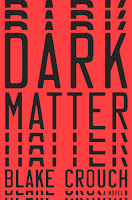It's embarrassing to admit now, but I loved
Ready Player One. I even ranked it my favorite book of 2011! I acknowledged some of its weaknesses in my review, but overall I found it entertaining. In the following years, after reading some thoughtful critiques, I came to have a more balanced perspective toward the novel, particularly Wade's egotistic behavior (especially towards his crush) and the novel's narrow, white-centric view of culture. Still, I wanted to read
Ready Player Two. I'd read some of the harsh critiques of Cline's sequel before picking up the book, so I felt prepared going in.
Ultimately, all the critiques are appropriate and justified. RP2 is not a great book. And I'm still embarrassed to say I enjoyed it anyway.
In my review for RP1, I argued that one of the reasons I liked the book was because it was fun, a contrast to the Deep and Meaningful literature I'd like to think I typically read. That's undoubtedly true of RP2 as well. I wanted a silly romp with dumb characters and expected endings. And I got it!
So what to say about RP2? RP1 ends with its hero--Parzival/Wade-- winning Halliday's contest and gaining control of the OASIS, the virtual-reality world most of the world spends their days in. RP2 begins shortly after, but Cline thoughtfully realized that his book-one underdog hero is not nearly as fun when he's the richest and most powerful man on the planet. Wade was a whiner in book one, but at least he was a poor whiner. Now he's just an entitled brat who spies on his friends and uses his unlimited power to destroy people who oppose him. To address that, Cline almost immediately hits "reset." Rather than explore his hero's newfound power and the complicated issues around what it means to be human in a digital space, Cline has crafted a plot almost identical to RP1: there's a new puzzle challenge with a new series of obstacles that Wade and his band of friends must solve by relying on their encyclopedic knowledge of '80s culture! And this time, Wade will literally be saving the world!
Now, this challenge should be nonsense. Did I say that Wade is the richest and most powerful man on the planet? That he has a giant corporate team at his beck and call? That it makes no sense whatsoever that he and his three friends would essentially go it alone to solve a puzzle necessary to save the lives of half a billion people? But, of course, reading about a CEO navigating personnel is boring. It's more fun if Wade and his merry band have to use their pluck, courage, and friendship to save the world.
Like in RP1, Wade, Shoto, Aech, and Art3mis must pass through '80s nostalgia to solve the puzzle. And, like before, this premise is easier to accept if you hand wave... a lot. Because the reader now knows Aech is a Black woman (she concealed her identity, playing as a white male avatar in RP1), she can occasionally pipe in on the fact that all of this nostalgia is white (and every other normative). But beyond Aech's comments, RP1 rarely acknowledges any culture beyond the white suburban "mainstream." Instead, RP1 and RP2 exist in a world where everyone has dedicated their lives to '80s pop culture. Which, again, makes no sense, even if you accept the insane popularity of Halliday. Sure, plenty of people are John Hughes fans (I guess? Are there still huge John Hughes fans?). But enough to painstakingly recreate every detail of his movies into a virtual world?
In fact, the whole RP1/2 universe suggests that everyone devotes their lives and days to recreating nostalgia from the past. I can understand why the OASIS is insanely popular. But why wouldn't people create new worlds? New adventure? New game forms? Why, instead, make intricate versions of Middle-earth or Prince-worship planets? Aren't there new forms of entertainment? Why do people spend their days completing insanely difficult quests in these worlds? Plenty of people don't do that in video games today!
But I'm getting sidetracked. Wade's quest is made all the more challenging because Art3mis/Samantha, the "love of his life" from book one, broke up with him a week after the first book's end. She's worried about the OASIS' stranglehold on people's lives. Wade's super mopey about this. But, don't worry, in comes Quest to Save Humanity and, uh, their relationship is fixed? I've written about a lot of nonsense, but Wade and Sam's relationship takes the cake. She's furious at him and has legitimate concerns about the power of the OASIS and their new neural hardware (the ONI), but once the quest starts, she appears to forgive him immediately. At the end of the book, they're back together, despite nothing changing. In my review of RP1, I noted that "the problematic nature of most of the world spending all their time online is only slightly addressed." In RP2, the problematic nature is addressed via Sam's concerns. And then completely dropped.
I'm not even going to go into the bizarre "let's live forever" ending.
Still, though I've wasted far too much of my and my imaginary audience's time complaining, I liked it. I know! I read it quickly. It was stupid and fun and the jokes were bad and the relationships terrible and the world underdeveloped and real issues unaddressed and still whatever. I liked it.
Side notes:
- Is Cline planning a book about L0hengrin, the woman who comes to Wade's assistance twice in the book? She's set up as an important character only to disappear and then deus ex machina the end. She has an entire side quest we hear nothing about! Is there a companion novel?
- Cline implies that everyone is pansexual now because the ONI allows people to experience sex in various forms and with different partners. It could be a cool idea... if actually explored.





















